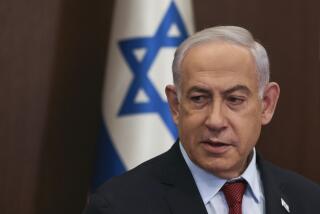Egypt voters appear to approve draft constitution in 1st round
CAIRO –- Approval of Egypt’s controversial draft constitution in an initial round of voting revealed the grass-roots power of Islamists even as the popularity of President Mohamed Morsi has dimmed in this increasingly polarized and economically struggling nation.
Unofficial results reported by state media from Saturday’s constitutional referendum indicated that the Islamist-backed draft charter passed by about 56% of the vote in 10 of Egypt’s 27 governorates. The results were immediately challenged by mainly secular opponents of the Morsi government, who cited thousands of alleged voting abuses and irregularities.
Though not a sweeping mandate, the outcome suggests that Morsi, a religious conservative, and his political allies in the Muslim Brotherhood rallied their base around a constitution that may gradually open the country to the strict influence of sharia, or Islamic law.
Official results will be announced after the second and final round of voting Saturday in the remaining 17 governorates. The momentum of the early results, however, indicates the constitution is likely to be adopted and enshrined into law. The final round moves to regions traditionally loyal to the Brotherhood and ultraconservative Salafis.
“Egyptians have spoken their mind,” the Brotherhood’s political wing, the Freedom and Justice Party, said in a statement. “The people have expressed their free will in the first stage of the constitutional referendum and have also proved to be highly aware. This is a genuine democratic process.”
The main opposition National Salvation Front accused the Morsi government and the Brotherhood of rigging the referendum. In a statement Sunday, the opposition group urged the commission overseeing the vote to investigate more than 7,000 alleged irregularities, including lack of judicial supervision.
The movement said the government urged its supporters to “terrorize and intimidate the opposition.” It called on Egyptians to demonstrate Tuesday “to defend their free will and … end this draft constitution, which is considered to be illegal.”
Egyptian human rights organizations demanded that the referendum’s first round be repeated. They pointed to a number of alleged violations and abuses, including instances in which women, some of them Christian Copts, were refused ballots.
Deadly protests and unrest in the weeks leading to the referendum exposed an Egypt desperate for stability but caught in a volatile struggle between Islamists and the mainly secular opposition. The opposition regards the evolving political Islam espoused by Morsi and the Brotherhood as a threat to freedom of expression and civil rights.
Those fears played out in the capital, Cairo, where the draft constitution was rejected by a projected 68% of the vote. Turnout in governorates across Egypt was 33%. Those figures illustrate the disturbing gap between Morsi, a political newcomer, and secularists and liberals who blame him for an unrepresentative constitution that betrays the democratic ideals behind the uprising last year that ousted longtime autocrat Hosni Mubarak.
Such friction is certain to frame the country’s political discourse for the foreseeable future and affect other fledgling governments rising from nearly two years of upheaval across the Middle East and North Africa. The Egyptian constitution battle and Morsi’s recently self-expanded powers have damaged his image at a time unity is needed to ease the country’s severe economic problems.
“There is no constitution in the world that would allow for stability with this kind of division,” said Hazem Hosny, a political science professor at Cairo University. “We are divided on core freedoms, political ideologies and the very path this country should take. With this kind of division, Morsi will surely face a resistant nation.”
He added: “Morsi should tread lightly, but the course of his actions proves he will continue down his path regardless of consequences.... The military will not stay on the sidelines if they find Morsi’s decisions a threat to national security or if jihadist Islamists become more vocal and active in the country.”
Such a bitter atmosphere could hurt the Brotherhood in parliamentary elections expected early next year. The Brotherhood controlled nearly 50% of the last parliament, which was dissolved in June by the Supreme Constitutional Court. Morsi said the court — dominated by Mubarak-era judges — was attempting to derail Egypt’s political transition.
The opposition will try to exploit Morsi’s damaged credibility, but its leaders are split and often at odds articulating an inspiring alternative to the Brotherhood’s political dominance. That dynamic allowed Morsi and the Brotherhood to rush through an unpopular constitution without losing their grip on power.
The proposed constitution is not explicitly rooted in sharia. The document protects the presidency and preserves wide powers for the military. It does, however, leave open to interpretation a number of articles regarding women’s rights, labor unions, freedom of expression, blasphemy and permitting the nation’s leading clerics to be consulted on legislation.
Liberals fear such vagueness could lead to diminished civil liberties if Islamists control parliament.
Special correspondent Reem Abdellatif contributed to this report.
More to Read
Start your day right
Sign up for Essential California for news, features and recommendations from the L.A. Times and beyond in your inbox six days a week.
You may occasionally receive promotional content from the Los Angeles Times.







